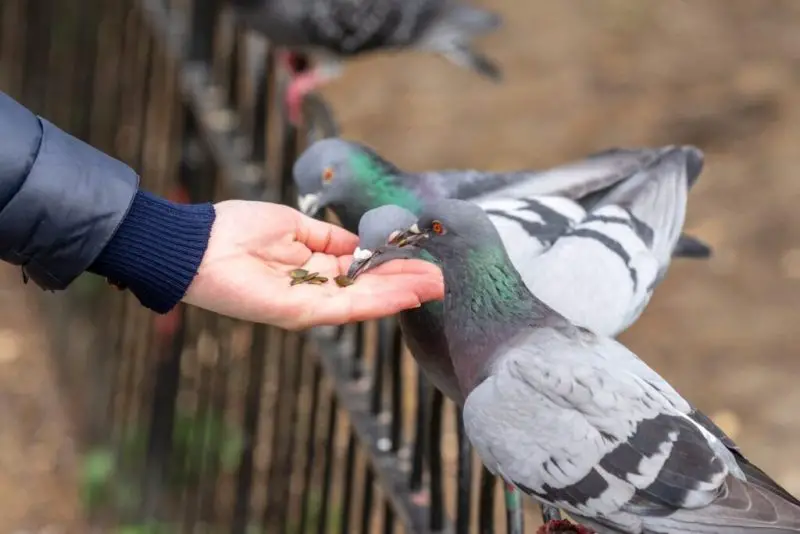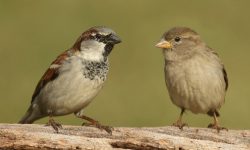Introduction: From Street Corners to Home Perches
Rock Pigeons (Columba livia) are everywhere—in cities, parks, rooftops, and plazas. These familiar birds, with their iridescent neck feathers and friendly cooing, are often seen as mere urban dwellers. But did you know that you can actually keep a Rock Pigeon as a pet? In fact, Rock Pigeons have been domesticated for thousands of years, originally used for message delivery and racing. Today, these birds are not only intelligent and affectionate, but also surprisingly easy to care for—with the right approach.
This guide answers a simple question—can you keep a Rock Pigeon?—and walks you through everything you need to know about caring for this adaptable and often overlooked companion.

Is It Legal to Keep a Rock Pigeon?
Domestic vs. Wild Rock Pigeons
Before you take a pigeon under your wing, it’s important to understand the legal and ethical considerations. In many places, wild birds are protected by laws that prohibit capturing or keeping them without permits. However, Rock Pigeons are not protected under the Migratory Bird Treaty Act in the U.S., since they are considered non-native, invasive species.
That said, you should not take injured or healthy wild pigeons from the street without understanding local wildlife regulations. The best approach is to adopt domesticated or rescued pigeons from bird rescues or pigeon fanciers. These birds are used to human care and often cannot survive in the wild.
Check Local Laws
Laws vary by country, state, or municipality. While most places allow keeping domesticated pigeons, you should check:
Zoning regulations (especially for outdoor lofts)
Limits on pet numbers
Wildlife rehabilitation or rescue licensing if caring for an injured bird
Why Keep a Rock Pigeon?
Intelligent, Affectionate, and Incredibly Underrated
Rock Pigeons are far more than the feathered fixtures of urban parks—they are, in fact, some of the most intelligent and emotionally attuned birds you can welcome into your home. Studies have shown that pigeons can recognize themselves in mirrors, differentiate between human faces, and even learn to categorize objects, numbers, and words. This level of cognitive ability puts them on par with parrots and some primates, yet pigeons are rarely credited for their remarkable minds.
What truly endears them to their owners, however, is not just their smarts, but their gentle personalities. Pigeons are naturally social animals that form strong pair bonds and affectionate relationships—not only with other birds, but with people. A hand-raised pigeon may follow you from room to room, perch calmly on your shoulder, and coo softly as it nuzzles into your neck. They respond to routine, recognize your voice, and some will even greet you with fluttering wings or light pecks of affection. For many pigeon enthusiasts, these birds become more than pets—they become trusted companions with unique personalities and moods.
Quiet, Clean, and Surprisingly Easy to Care For
Unlike louder or more demanding bird species such as parrots, Rock Pigeons are quiet housemates. Their vocalizations are limited to soft coos, low grunts, and gentle murmurs—relaxing sounds that are often associated with calm and domestic tranquility. You won’t hear any screeching or mimicry; instead, a pigeon’s presence is soothing and low-key, perfect for apartment dwellers or those sensitive to noise.
Hygiene is another unexpected advantage. Pigeons are naturally clean birds that preen frequently, love bathing, and keep themselves remarkably tidy. With regular cage or loft maintenance, there is minimal odor. Unlike parrots, they don’t chew wires, furniture, or woodwork. And with a bit of consistency and training, many pigeons can even be taught to return to a single perch or tray for droppings—making them some of the most low-maintenance indoor birds available.
Their diet is simple, their healthcare needs are manageable, and their gentle, adaptable nature makes them an ideal choice for first-time bird owners, seniors, and families alike. Whether you’re seeking a calm animal to share your morning routine or a curious friend to greet you at the window, the Rock Pigeon offers companionship that is both deeply rewarding and surprisingly effortless.
Housing: Where Should Your Pigeon Live?
Creating a Safe and Comfortable Home for Your Rock Pigeon
Whether you live in a bustling city apartment or a countryside home with a backyard, Rock Pigeons are highly adaptable and can thrive in both indoor and outdoor environments—provided their housing is safe, clean, and enriched. Choosing the right setup depends on your available space, your daily routine, and how closely you want to interact with your feathered friend.
Indoor Housing: Cozy Companionship Up Close
Keeping a Rock Pigeon indoors can be a deeply rewarding experience. These birds bond strongly with their caretakers, and housing them inside allows for daily interaction, social bonding, and even shared relaxation time as they perch beside you on the couch or watch out the window.
An ideal indoor home is a spacious cage or flight aviary—at least 30 inches wide by 30 inches deep, with ample horizontal space for wing-stretching and short flights. Vertical height is important too, especially if you plan to include several levels of perches. Natural wooden perches of varying thickness help keep their feet healthy, and a nest box or corner hideaway offers privacy and a place to rest or lay eggs.
Line the bottom of the cage with paper, straw, or soft bedding to absorb droppings and make cleaning easier. Many owners train their pigeons to return to a “poop spot” or tray, which simplifies maintenance. If the bird is tame and flighted, daily free-flight time in a pigeon-proof room—free of open windows, ceiling fans, or toxic plants—is ideal for both mental and physical health.
Outdoor Housing: A Loft Built for Life in the Sky
If you have access to a yard or rooftop space, an outdoor loft is the perfect way to house multiple pigeons while letting them enjoy fresh air and sunlight. A well-constructed pigeon loft is more than a coop—it’s a haven. It should include:
-
Weatherproof roofing and solid walls for insulation from heat, cold, and rain
-
Ventilation windows covered in mesh to ensure airflow without drafts
-
An enclosed fly pen or aviary space where pigeons can stretch their wings safely
-
Predator-proof features: reinforced wire mesh, secure locks, and raised perches away from ground-level threats like raccoons, cats, or hawks
Inside, build multiple perches, shelves, and nesting areas so birds can choose where to rest and roost. Use removable trays or drop-through floors to simplify cleaning. Pigeons are highly social animals, so outdoor lofts are best when housing at least a bonded pair or small group—they’ll preen each other, coo softly, and share warm companionship.
Enrichment and Daily Care
Regardless of whether your pigeon lives inside or out, enrichment is key. Provide toys made from bird-safe materials, mirrors, foraging opportunities, and items to explore. Offer a shallow dish for bathing several times a week—pigeons adore splashing and preening afterward. Ensure they get exposure to natural light or full-spectrum bird-safe lamps to support their circadian rhythms and vitamin D production.
Whether perched inside your home or fluttering in a backyard loft, Rock Pigeons thrive in spaces that offer security, comfort, and connection. Give them the right home, and they will reward you with years of gentle affection and loyal companionship.
Feeding: What Do Rock Pigeons Eat?
Balanced Nutrition for a Healthy Bird
Pigeons are granivores, which means they thrive on a diet of grains and seeds. A balanced pigeon diet includes:
Commercial pigeon feed (a blend of corn, peas, millet, wheat)
Occasional fruits and leafy greens like kale or spinach
Grit and calcium supplements (for digestion and bone health)
Clean, fresh water at all times
Avoid feeding processed human food, chocolate, avocado, or salty snacks—they can be toxic to birds.
Health and Hygiene
Regular Cleaning and Monitoring
Keeping a Rock Pigeon healthy involves basic hygiene and vigilance:
Clean cages or lofts weekly to prevent odor and disease.
Watch for signs of illness: fluffed feathers, lethargy, abnormal droppings, or nasal discharge.
Provide access to bathing water 2–3 times a week. Pigeons love splashing in shallow trays.
If your pigeon appears sick, consult an avian veterinarian, preferably one with experience in treating pigeons.
Training and Interaction
Can You Tame a Pigeon?
Yes! Pigeons are gentle and easy to tame, especially if hand-fed from a young age. To bond with your pigeon:
Sit near them daily, talk softly, and offer treats like millet or sunflower seeds.
Gently handle them after trust is established.
Avoid sudden movements and loud noises.
Pigeons can learn to return to a loft (a behavior called homing), recognize their name, and respond to voice or whistle commands.
Breeding and Lifespan
Should You Let Pigeons Breed?
Pigeons breed easily and often. If you keep male and female birds together, they may produce chicks every few weeks. To avoid overpopulation:
Replace real eggs with dummy eggs to prevent hatching.
Separate sexes or house same-sex pairs if breeding is not your goal.
Pigeons can live 10 to 15 years in captivity with proper care, sometimes even longer.
Common Myths About Rock Pigeons
Are Pigeons Dirty?
This is perhaps the most persistent and unfair myth surrounding Rock Pigeons. Many people associate them with dirty sidewalks and crowded city squares, but the truth is: pigeons are exceptionally clean animals. In the wild and in captivity, pigeons preen themselves multiple times a day, using their beaks to straighten feathers, remove debris, and spread natural oils that protect their plumage.
The image of the “filthy city pigeon” has more to do with human neglect—overflowing trash cans, polluted urban environments, and lack of clean water sources—than with the birds themselves. In a home or aviary setting with regular cleaning, fresh food, and clean water, pigeons remain well-groomed, odorless, and tidy. They also love bathing and will enthusiastically splash in shallow water to keep their feathers in top shape.
Simply put, a cared-for pigeon is a clean pigeon.
Do They Carry Diseases?
Another myth that unfairly tarnishes pigeons is the fear that they are disease carriers. While it’s true that, like all animals, pigeons can harbor parasites or pathogens, the risk to humans is extremely low—especially when basic hygiene is maintained. In fact, pet pigeons are no more dangerous than parakeets, canaries, or parrots when raised in clean environments.
Veterinary experts agree that diseases commonly associated with pigeons (such as histoplasmosis or psittacosis) are extremely rare in pet settings. Most infections arise only in people with compromised immune systems who are exposed to massive quantities of dry droppings in unventilated spaces—conditions that simply do not apply to responsible pet care.
By cleaning cages regularly, washing hands after handling, and ensuring proper ventilation, you can safely enjoy a long and healthy relationship with your pet pigeon. In fact, many pigeon owners sleep with their birds nearby, let them roam the house freely, and even allow gentle interaction with children—all without health concerns.
Final Word on the Myths
Pigeons are misunderstood creatures—gentle, clean, and intelligent—who have suffered from centuries of urban bias and misinformation. With proper care, they are not only safe and hygienic pets, but also one of the most charming and rewarding birds you can welcome into your life.
Where to Get a Pet Pigeon
If you’re ready to welcome a pigeon into your life, consider:
Pigeon and dove rescues
Animal shelters
Local avian breeders or fanciers
Online adoption platforms (e.g., Palomacy Pigeon Rescue)
Never buy wild-caught birds or take them from the street unless they need emergency care.
Conclusion: A Companion Worth Cooing Over
Rock Pigeons are far more than background noise in the city—they’re affectionate, intelligent birds with a rich history alongside humans. With the right setup, care, and companionship, these urban doves make loyal, low-maintenance pets that surprise and delight. Whether you adopt a rescued bird or raise a tame pigeon at home, your bond with this humble species may be one of the most rewarding experiences in birdkeeping.






